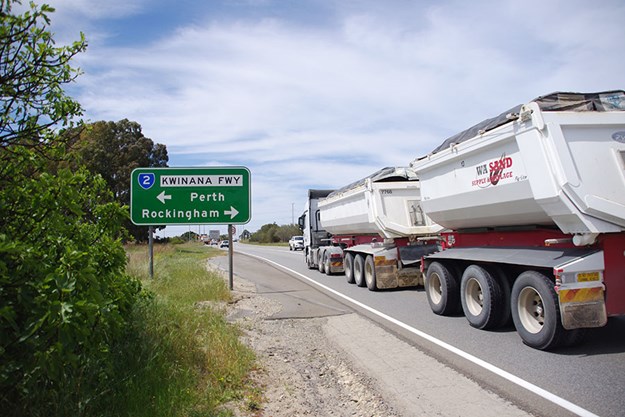Transport Workers Union welcomes state government training program to combat “second-rate” driver trainers
The McGowan government has announced up to $6.1 million in funding to raise the ranks of heavy vehicle drivers in Western Australians.
According to the state government, the decision follows extensive industry consultation.
The WA branch of the Transport Workers’ Union (TWU) welcomed the announcement, adding that the transport industry, in the past, has been a target of shonky training operators, putting unskilled and unsafe drivers out onto WA roads.
The TWU says the transport industry is also victim to an aging workforce, and shortages of skilled operators that may see the industry’s demise.
Labelled the job-ready Heavy Vehicle Driving Operations Skill Set, the program aims to train an estimated 1000 skilled workers.
WA transport minister Rita Saffioti says the government has worked collaboratively with industry to create this program to make sure it gives truck drivers the skills they need while also helping jobseekers increase their employability.
“Western Roads Federation and the TWU approached the Premier, Minister for Education and Training and myself, asking to create a dedicated training course for truck drivers.”
RELATED ARTICLE: Simulator to help SA heavy vehicle learner drivers
Consequently, the McGowan Government says it will remove barriers to entry in Heavy Rigid (HR), Heavy Combination (HC) or Multi-Combination (MC) heavy vehicle driving through both theoretical and hands-on practical truck driver training.
The transport portfolio is aimed at providing targeted funding for delivery of industry mentoring for program graduates, to be co-ordinated by Western Roads Federation (WRF). For smaller transport companies with the capacity to provide on-the-job training, the program is predicted to be especially crucial.
The Heavy Vehicle Driving Operations Skill Set will be delivered in Perth’s north-eastern suburbs by Central Regional TAFE and is an expansion of the Heavy Haulage Driving Operations Skill Set being delivered in the south-west town of Collie, which will transition to the new program.
“Training is a major part of our economic recovery from COVID-19, and this new training opportunity will give Western Australian job seekers the opportunity to start a career in this essential industry,” says state education and training minister Sue Ellery.
“Our job-ready skill sets have supported many industries throughout the pandemic and will place Western Australia in an ideal position for economic recovery post COVID-19.”
 |
|
The WA government plans to remove barriers for those wishing to attain heavy rigid, heavy combination and multi-combination licences. Photo by Greg Bush
|
The new program is said to have been modified to provide students with more of the practical skills needed by industry, including on-road experience. The WA Government claims the short course, developed to have a strong focus on practical skills, will be an Australian first.
The TWU says it has been campaigning for many years for accredited training and education pathways to ensure the industry is putting professional and safe drivers on WA roads and to offer young people a sustainable, safe, and long-term career in the transport industry.
“This pilot program will go a long way to addressing the shortage of drivers in the transport industry,” says TWU state secretary Tim Dawson.
“It Is important that not only is the training for upskilling those working in the industry adequate, but new people entering the industry are job ready when they are sent out to drive a truck or any other type of heavy vehicle.
“It is about time that the transport industry moved away from accepting drivers trained by second-rate training operators and the State Government ensured that there is an avenue for proper accredited education and safe, professionally trained drivers are put on our roads.
“It is great to see the WA State Government recognise the essential work of truck drivers and ensure the long-term future of the industry by offering it as a sustainable and feasible pathway for young people.”


